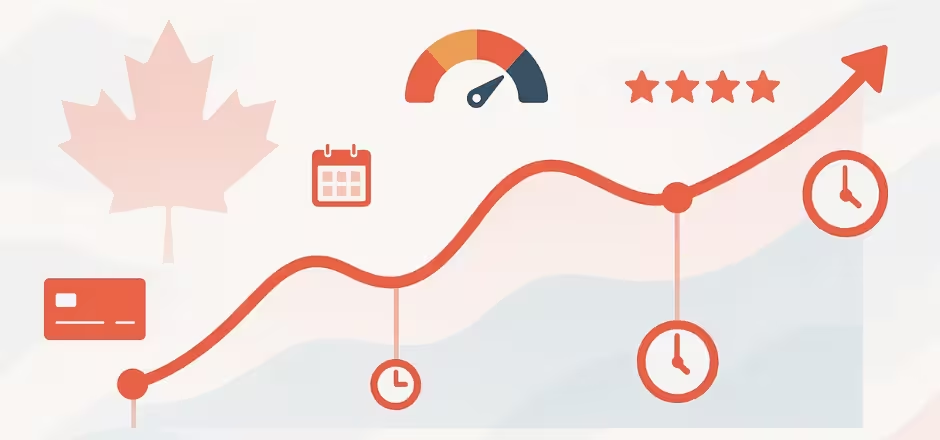When financial health in Canada is concerned, one of the most important things to track is your credit score. In 2025, knowing the average Canadian credit score by age is crucial than ever before. Credit scores will determine your capacity to be granted loans, mortgages, or credit cards, and even impact rental and job opportunities. What’s more, credit scores also widely differ between various age groups across Canada.
This blog delves into the average Canadian credit score by age in depth, the reasons behind the differences, and how you can ensure a healthy credit score at every age.
What Is a Credit Score in Canada?
A credit score is simply a number between 300 and 900, which financial institutions use to determine creditworthiness. Credit scores are a calculation based on several factors like payment history, credit utilization, types of credit accounts, and recent credit inquiries.
A high credit score indicates low risk to a lender and gains the best loan offers, such as a lower rate and higher borrowing limits. The average Canadian views their credit score against others their same age; this is where average Canadian credit scores by age can offer some insight into where you might fit financially.
Why Credit Scores Vary by Age
Age is a major contributor to a person’s credit score. Younger Canadians will have lower credit scores as they will have less credit history, whereas older Canadians will have higher scores based on decades of good credit behavior. The mean Canadian credit score by age also mirrors economic patterns specific to every generation.
For instance:
- Young adults (18-25) are typically carrying student loans and are just starting to use credit.
- Mid-life adults (26-45) generally have mortgages, auto loans, and personal credit lines.
- Older adults (46-65) might have long-standing credit history with a combination of open and closed accounts.
- Retirees (65+) may have reduced credit use but still had good payment records.
These differences make sense of the Canadian credit score by age ranges and lenders’ expectations for each group.
How to Improve Your Credit Score at Any Age
Regardless of your age, it is possible and well worth it to upgrade your credit score. Below are some universal steps:
- Pay Bills Timely: This is among the most influential elements of your score.
- Keep Credit Utilization Low: Avoid using more than 30% of your credit limit.
- Limit New Credit Accounts: Extreme hard inquiries will penalize your credit score.
- Monitor your Credit Report: Regular monitoring detects errors or fraud.
- Keep a Mix of Credit Accounts: It can help to have a mix of revolving and installment credit.
Adhering to these habits will improve the average Canadian credit score by age for your respective group and help provide better financial opportunities for you.
Average Canadian Credit Score by Age: Explore myths by age group
Most Canadians presume there’s one “good” score to target, but scores change based on life stage. Here’s a snapshot of how the average Canadian credit score by age tends to trend:
- 18-24 years: Average about 680. This age group is just starting to build credit histories using student loans or entry-level credit cards.
- 25-34 years old: Average rises to around 690. Younger professionals in this age group begin taking on more credit and taking out car loans or mortgages.
- 35-44 years old: Scores tend to rise to 705 as debt loads rise, but so does credit experience.
- 45-54 years old: Most Canadians achieve averages of about 720 because they have longer histories of credit and lower debt.
- 55+ years old: Generally have scores in the range of 730-750, based on decades of prudent lending and fewer new credit requests.
Surprisingly, statistics of average Canadian credit score by age and gender reveal that both men and women have almost the same scores across the majority of age groups, with slight differences based on money habits and spending habits.
Most myths claim you require a flawless score to be eligible for loans, but the fact remains that any score over 700 is great for most lenders. Being informed of the average credit score Canada by age ensures that you set personal targets without worry.
Frequently Asked Questions (FAQs)
1. What is a good Canadian credit score in 2025?
A good Canadian credit score is usually between 660 and 724. Very good to excellent credit is scored above 725.
2. Is the average Canadian credit score by age province-specific?
Yes, credit scores are influenced by regional financial trends. Urban centers with greater expenses, for example, would have slightly lower averages for younger demographics.
3. How do I access my credit score in Canada?
You may ask Equifax or TransUnion for a free report once a year or utilize a free monthly update financial app.
4. Is the trend of the average Canadian credit score by age going up or down?
To date in 2025, scores have edged up slightly, suggesting enhanced financial literacy and affordable credit management tools.
5. What is the ideal age to begin establishing credit in Canada?
The sooner you begin at 18, the better. It will allow you to have more time to build a solid history and come in line with the average credit score Canada by age guidelines.
6. How frequently should Canadians access their credit score?
You would want to review your credit score annually at least to make sure it is accurate and for monitoring identity theft or mistakes. This would assist you in achieving or maintaining a credit score higher than the average credit score by age Canada.
Curious how your credit score stacks up? Compare by age group, understand where you stand, and take steps today to boost your financial health! For any query, contact NewsMagToday.



